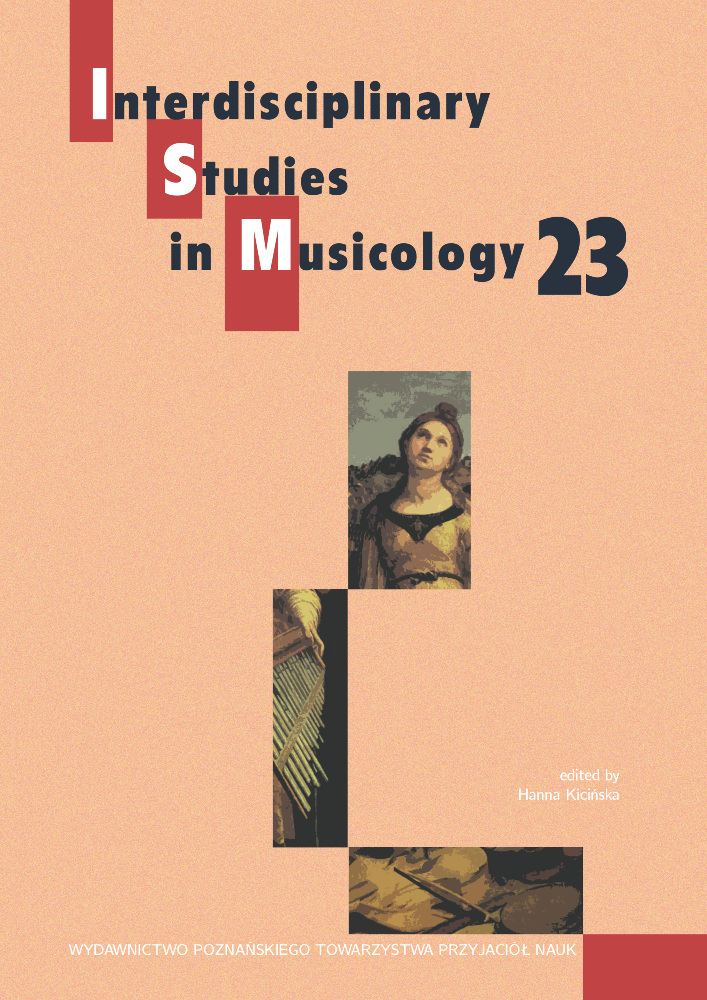Abstract
The well-known practice of transcribing the most famous works by outstanding composers, especially for the piano, was one of the most widely used methods of popularising music in the 19th century. One can say that it had a similar function to literary translation – just as different language versions and adaptations prove the popularity of literary masterpieces, the fact that transcriptions (for piano, other instrument, or a different ensemble) were created was evidence of the particular interest of the audience. Apart from the composer himself, transcriptions and paraphrases of vocal works by Moniuszko were made by Henryk Melcer-Szczawiński, Władysław Krogulski, Zygmunt Noskowski, Ignaz Friedman, Maurice Dietrich, and others. Nowadays, the role the piano used to perform in a house has largely been replaced by the recording industry and modern media and access to music is unlimited in most countries. This situation significantly reduces the demand for creating “usable” versions of works by famous composers. So is there room for new arrangements of Moniuszko’s works on the modern music market? Jazz productions by Bogdan Halicki and the latest proposal from Włodek Pawlik prove that the problem of promoting music by this Polish composer remains valid – and as time goes by, there is a growing need to adjust these compositions to the tastes of modern audiences. The aim of this article is to characterise transcriptions and arrangements of vocal works by Stanisław Moniuszko and to show different transformations of the original pieces depending on their functions and potential listeners by analogy with literary translation.
References
Bassnett, S. (2002). Translation Studies. London: Routledge. DOI: https://doi.org/10.4324/9780203427460
Belloc, H. (1959). On Translation. The Bible Translator, 10(1): pp. 83–100. DOI: https://doi.org/10.1177/000608445901000204
Chmara-Żaczkiewicz, B. (1977). Transkrypcje fortepianowe Melcera w świetle transkrypcji Liszta [Melcer’s piano transcriptions in light of Liszt’s transcriptions]. In Muzyka fortepianowa, 3, (pp. 41–56). Gdańsk: Akademia Muzyczna im. Stanisława Moniuszki.
Chór, 3/4 (1 April 1936).
Duszyk, K. (Ed.), (2000). Stanisław Moniuszko [catalogue of works]. In E. Dziębowska (Ed.). Encyklopedia muzyczna PWM [PWM music encyclopaedia], biographical part, vi (pp. 307–327, 333–335). Kraków: Polskie Wydawnictwo Muzyczne.
Gołąb, M. (2012). Spór o granice poznania dzieła muzycznego [The dispute over the epistemological limits to music analysis]. Toruń: Wydawnictwo Naukowe UMK.
Hinson, M. (1990). The Pianist’s Guide to Transcriptions, Arrangements and Paraphrases. Bloomington: Indiana University Press.
Kaufman, G. (2017). Gaspar Cassadó: Cellist, Composer and Transcriber. London: Routledge. DOI: https://doi.org/10.4324/9781315583792
Kregor, J. (2010). Liszt as Transcriber. Cambridge: Cambridge University Press.
Literska, B. (2020). Nineteenth-Century Transcriptions of Works by Fryderyk Chopin, (J. Comber, Transl.). Berlin: Peter Lang. DOI: https://doi.org/10.3726/b16258
Negrey, M. (2002). Zygmunt Noskowski. In E. Dziębowska (Ed.). Encyklopedia muzyczna PWM [PWM music encyclopaedia], biographical part, vii (pp. 95–106). Kraków: Polskie Wydawnictwo Muzyczne.
Piątkowska-Pińczewska K. (2002). Henryk Melcer-Szczawiński. Życie i twórczość [Henryk Melcer-Szczawiński: his life and work]. Kalisz: Instytut Pedagogiczno-Artystyczny UAM.
Polona Digital Library. (2023, July 24). https://polona.pl.
Poniatowska, I. (1991). Muzyka fortepianowa i pianistyka XIX wieku. Aspekty artystyczne i społeczne [Nineteenth-century piano music and pianism]. Warszawa: Rewasz.
Poniatowska, I. (2011). Romanticism, Part 2A 1850–1900: Musical Output (J. Comber, Transl.). Warszawa: Sutkowski Edition.
Popovič, A. (1971). Poetika umeleckého prekladu. Proces a text [The poetics of artistic translation: process and text]. Bratislava: Tatran.
Popovič, A. (1975). Teória umeleckého prekladu: Aspekty textu a literárnej metakomunikácie [Theory of artistic translation: aspects of the text and literary metacommunication]. Bratislava: Tatran.
Wroński, W. (1960). Zygmunt Noskowski. Kraków: Polskie Wydawnictwo Muzyczne.
License
Copyright (c) 2023 Małgorzata Grajter

This work is licensed under a Creative Commons Attribution-NoDerivatives 4.0 International License.

